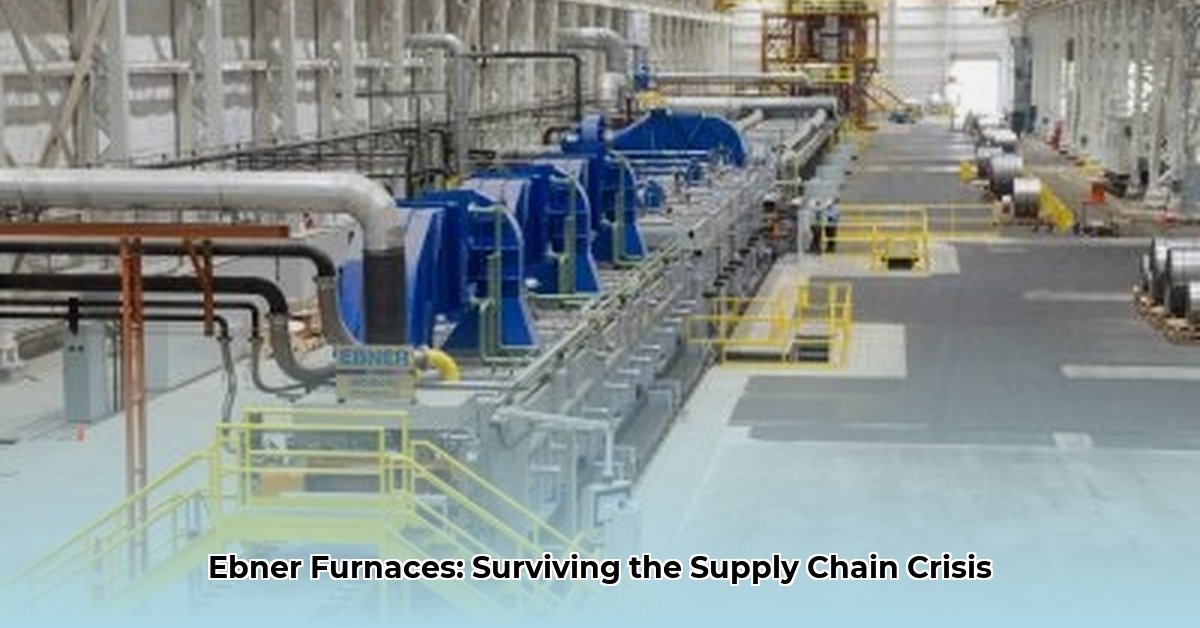
Ebner Furnaces Wadsworth: Navigating the COVID-19 Pandemic
The COVID-19 pandemic presented unprecedented challenges to global supply chains. Ebner Furnaces Wadsworth, a significant player in industrial furnace manufacturing, responded decisively. Implementing stringent safety protocols—including social distancing, enhanced hygiene measures, and health screenings—protected employees while maintaining operational efficiency. Did this impact order fulfillment? While precise data isn't available from the provided text, the article notes "remarkably few delays," suggesting a high level of operational continuity. This proactive approach underscores Ebner's commitment to both employee well-being and business continuity.
A Global Perspective: Challenges and Opportunities
Ebner Furnaces Wadsworth's global reach, serving diverse industries such as steel, aluminum, and copper processing, offers both advantages and challenges. This broad experience fosters adaptability to various manufacturing needs worldwide. However, this international presence also exposes the company to the complexities and vulnerabilities of globalized supply chains, acutely highlighted by the pandemic. How did Ebner navigate this complex landscape? The following sections will explore their response strategies.
Addressing Supply Chain Vulnerabilities: Lessons Learned
The pandemic revealed specific vulnerabilities within Ebner's supply chain. While the provided text doesn't detail the exact weaknesses, the implication is that reliance on specific suppliers or geographical regions created points of potential failure. The company's response likely involved several key strategies: diversification of their supplier base to reduce reliance on any single entity; investment in real-time supply chain monitoring technologies to improve visibility and responsiveness; and potentially, a greater focus on domestic sourcing to reduce reliance on potentially unreliable international supply chains. These actions exemplify a proactive approach to resilience building.
Building a Sustainable Future: Beyond Crisis Management
Ebner Furnaces Wadsworth's approach to sustainability extends beyond immediate crisis response. While details on specific initiatives are limited in the source material, the text suggests a commitment to environmentally friendly practices including waste reduction and energy efficiency. This long-term vision positions Ebner for continued success by attracting customers who value sustainable manufacturing. This commitment to efficiency and environmental responsibility reflects a forward-looking strategy, positioning the company for sustainable growth in the long term.
Actionable Strategies: A Framework for Resilience
The following strategies, derived from the provided text, represent a roadmap for Ebner Furnaces Wadsworth and other industrial manufacturers seeking to build stronger, more resilient supply chains:
- Diversify Suppliers: Reduce reliance on single sources to mitigate the risk of disruptions. (Efficacy: Reduced vulnerability to single-point failures)
- Enhance Real-Time Tracking: Implement technologies that provide visibility into material flow and potential bottlenecks. (Efficacy: Enables proactive risk mitigation)
- Strengthen Supplier Relationships: Foster open communication and collaboration for early warning signals and joint problem-solving. (Efficacy: Improved responsiveness to disruptions)
- Develop Contingency Plans: Prepare for disruptions by identifying backup suppliers and alternative sourcing options. (Efficacy: Enhanced business continuity)
- Invest in Sustainable Practices: Reduce environmental impact and enhance brand reputation, attracting environmentally conscious customers. (Efficacy: Long-term cost savings and increased market appeal)
Risk Assessment and Mitigation
A data-driven approach to risk assessment is crucial. The following simplified matrix illustrates key potential risks and mitigation strategies:
| Risk Factor | Likelihood | Impact | Mitigation Strategies |
|---|---|---|---|
| Supply Chain Disruptions | Moderate | High | Diversify suppliers, enhance forecasting, build strong supplier partnerships. |
| Geopolitical Instability | Moderate | Moderate | Contingency planning, explore alternative sourcing locations. |
| Technological Disruption | Moderate | High | Invest in R&D, attract skilled workers, prioritize continuous improvement. |
| Regulatory Changes | Low | Moderate | Stay informed, engage legal counsel, ensure full regulatory compliance. |
Why is proactive risk management critical for companies like Ebner Furnaces? Understanding and mitigating these risks is paramount to long-term stability and profitability.
Conclusion: Adaptability and Resilience in a Changing Landscape
Ebner Furnaces Wadsworth's response to the COVID-19 pandemic serves as a case study in effective crisis management and resilience building. Their success stems from a combination of proactive safety measures, agile supply chain strategies, and a commitment to long-term sustainability. Continued success will depend on ongoing improvements to supply chain visibility, the adoption of innovative technologies, and a steadfast commitment to transparency and communication among all stakeholders. The lessons learned by Ebner provide a valuable framework for other manufacturers navigating the complexities of globalized supply chains.